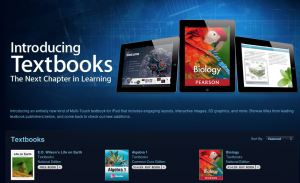
Last Tuesday, Apple Inc. announced their newest software initiative: a push into peddling digital textbooks. The company touted the many ways students benefit from electronic textbooks.
With embedded video, photo galleries, and interactive infographics, they make reading assignments akin to browsing the web, already a popular student pastime. One digital textbook—or even a hundred—is only as heavy as the iPad on which it’s stored (1.3 lb), as opposed to the multi-pound editions carried in backpacks. They are cheaper than physical editions because there’s no shipping or materials needed (that makes them environmentally friendly as well), and textbooks will never depreciate with the release of a new edition—the books update automatically through the Internet. The digitization of textbooks seems like a godsend to all the students with crooked spines, empty wallets, and zero patience, so isn’t it a shame that college students are being left behind? But as many already know, college-level e-textbook options are abysmal (at best).
Indeed, as MG Siegler noted on TechCruch, Apple’s announcement, while ideal for college kids, focused squarely on high schoolers (all the textbooks available to purchase in iTunes are basic, high school editions). This seems wildly counter-intuative—how many textbooks did anyone even have to buy in high school? The first semester of freshman year, loaded down with textbooks for introductory chemistry and math classes, I easily spent over $500. I wish I could have gotten an iPad instead of lousy texts that were useless four months later! And even though the iPad was the most wishlisted item by teenagers over this last holiday, how many parents would entrust a teen who has broken innumerable cell phones with a $500 piece of technology? Plenty of parents trust their college-bound students with expensive, fragile laptops; an iPad isn’t all that different.
Unfortunately, Apple’s failure of college students is typical—the state of digital textbooks on campus today is abysmal. They are hardly ever offered; when they are sold at the campus bookstore they’re only readable on a computer, cost nearly as much as a print edition, prevent you from copying or printing to “prevent copyright infringement,” and lock themselves at the end of the semester (most are just “rental” e-books). What a load of shit. While they should be a meaningful improvement in terms of book buying, digital textbooks are mostly a scam instead.
It’s time for publishers to get serious about offering high-quality, college-level electronic textbooks. Everybody benefits: students save money on cheap copies that don’t take up any space in already-cramped dorm rooms, while publishers get kids to avoid the used-textbook market altogether. As digital textbooks become more popular, it would be fantastic if college students were seen as prime customers.


I’m still not entirely sold on ebooks either. Its convenient of course, but since they aren’t tangible, there is no way to sell them back when class is through. For the past few semesters I’ve used Bigwords.com to price compare, buy used and then sell back when I’m finished with them. I’m not trying to sound spammy, it’s just been the best way for me to make my money back on my books.
Thanks Ron, people can get in to some nasty conversations when they tweet about those subjects, so they are best to leave alone Karen recently posted..Join In The Blog Engage 500 USD Guest Blogging Contest 2 of 4